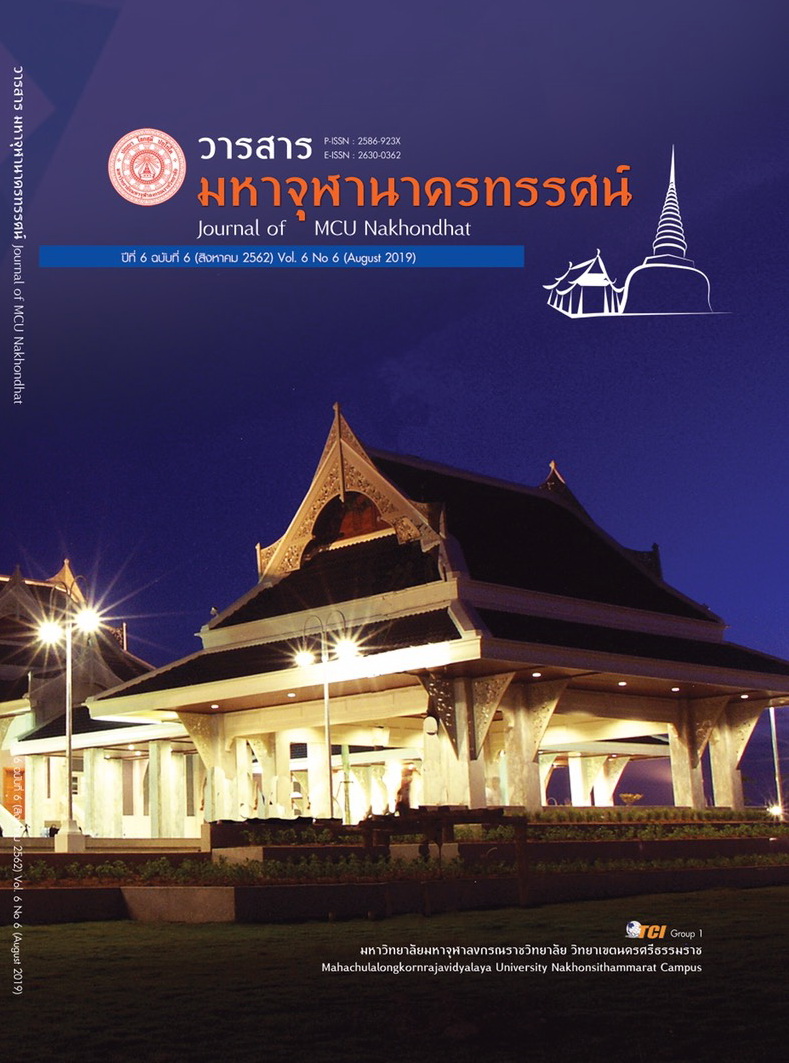A MODEL OF CREATIVE LEADERSHIP DEVELOPMENT BASED ON YONISOMANASIKARA FOR EARLY CHILDHOOD EDUCATION INSTITUTIONS UNDER LOCAL GOVERNMENT ORGARNIZATION
Main Article Content
Abstract
This study has the following objectives: 1) the study of the problems of leadership, creativity, based on reflective thinking for administrators, early childhood education, 2) development of leadership development, creativity, based on reflective thinking for early childhood education and 3. ) presents a model of leadership development, creativity as the main place for reflective thinking in early childhood education. Under the Local Government This research combines research methods. The regulations include a qualitative research study document. Depth interviews School administrators Number 5 / person and group chat. The experts 8 Man Picture and quantitative research. The samples administrators of early childhood education. Under the 379 local government statistical analysis using percentage, mean and standard deviation.
The research found that:
- Problems of leadership, creativity, based on reflective thinking for preschool education administrators find creative problem with the 5 elements of leadership in the field of flexible 1) flexibility 2) imagination 3) aspects Intellectual ability or intelligence 4) creative problem solving 5) vision
- Model of leadership development, creativity, based on reflective thinking for preschool education. Under the Local Government consists of five parts: 1) the development of teaching of teachers 2) the purpose of improving the teaching of master teachers 3) the development of the teaching of the Master Teacher, 4) bringing the format to use. 5) the conditions of success
- leadership model developed by creative place for reflective thinking in early childhood education. Under the Local Government consists of five parts: 1. Introduction 2. Objectives 3. The process of leadership development, creativity consists of 1) the composition of the leadership, creativity, 2) develop a creative process based on reflective thinking, 3) feature a party. be creative by Yonisomanasikara 4) main Yonisomanasikara 5) projects, leadership development ideas. inventive by the way, 10 Yonisomanasikara
Article Details
References
จักรกฤษณ์ โพดาพล. (2556). ภาวะผู้นำเชิงสร้างสรรค์ของผู้บริหารเทศบาลตำบลในจังหวัดร้อยเอ็ด. ใน วิทยานิพนธ์ศึกษาศาสตรมหาบัณฑิต สาขาวิชาบริหารการศึกษา. มหาวิทยาลัยมหามกุฎราชวิทยาลัย วิทยาเขตศรีล้านช้าง.
นเรศ บุญช่วย. (2556). การพัฒนาภาวะผู้นำเชิงสร้างสรรค์ของผู้บริหารสถานศึกษา. ใน ดุษฎีนิพนธ์ครุศาสตรดุษฎีบัณฑิต สาขาวิชาการบริหารการศึกษา. มหาวิทยาลัยราชภัฏวไลยอลงกรณ์.
พระธรรมปิฎก (ประยุทธ์ ปยุตโต). (2542). พุทธธรรม (พิมพ์ครั้งที่ 6). กรุงเทพมหานคร: โรงพิมพ์มหาจุฬาลงกรณราชวิทยาลัย.
พิเชษฐ์ โพธิ์ภักดิ์. (2553). การพัฒนารูปแบบการบริหารโรงเรียนนิติบุคคล สังกัดสำนักงานคณะกรรมการการศึกษาขั้นพื้นฐาน. ใน ดุษฎีนิพนธ์ครุศาสตรดุษฎีบัณฑิต สาขาบริหารการศึกษา. จุฬาลงกรณ์มหาวิทยาลัย.
ภรณ์ทิพย์ ปั้นก้อง. (2559). ภาวะผู้นำเชิงสร้างสรรค์ของผู้บริหารโรงเรียน สังกัดสำนักงานเขตพื้นที่การศึกษาประถมศึกษาชลบุรี เขต 3. ใน วิทยานิพนธ์ศึกษาศาสตรมหาบัณฑิต สาขาวิชาการบริหารการศึกษา. มหาวิทยาลัยบูรพา.
สำนักงานคณะกรรมการการพัฒนาเศรษฐกิจและสังคมแห่งชาติ. (2554). แผนพัฒนาเศรษฐกิจและสังคมแห่งชาติฉบับที่ 11. กรุงเทพมหานคร: สำนักงานคณะกรรมการการพัฒนาเศรษฐกิจและสังคมแห่งชาติ.
สำนักงานรับรองมาตรฐานและประเมินคุณภาพการศึกษา. (2554). กรอบการประเมินคุณภาพภายนอกระดับการศึกษาขั้นพื้นฐาน. กรุงเทพมหานคร: สำนักงานรับรองมาตรฐานและประเมินคุณภาพการศึกษา.
สุพล วังสินธุ์. (2545). การบริหารโรงเรียนตามแนวทางการปฏิรูปการศึกษาไทย. วารสารวิชาการ, 5(6), 29-33.
สุภางค์ จันทวานิช. (2540). วิธีวิจัยเชิงคุณภาพ. กรุงเทพมหานคร: โรงพิมพ์แห่งจุฬาลงกรณ์ราชวิทยาลัย.
สุมน อมรวิวัฒน์. (2530). การสอนโดยสร้างศรัทธาและโยนิโสมนสิการ. กรุงเทพมหานคร: โอเดียนสโตร์.
อรรณพ พงษ์วาท. (2540). ผู้บริหารกับการพัฒนาศึกษา อะไร ทำไม อย่างไร. เชียงใหม่: คณะศึกษาศาสตร์ มหาวิทยาลัยเชียงใหม่.


